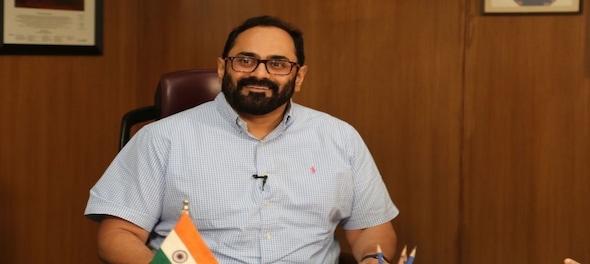
Minister of State for Electronics and Information Technology Rajeev Chandrashekhar defended the government's access to citizens' data as "lawful and legitimate in national security and emergencies" as opposition parties rallied to oppose a new digital rights law introduced in parliament on Thursday.
"The Digital Personal Data Protection Bill, 2023 introduced in Parliament is a very significant milestone in Prime Minister Narendra Modi ji's vision of Global Standard Cyber Laws for India's $1 trillion digital economy," he said on Twitter.
"Ministry of Information Technology has developed this bill after extensive consultations which I personally led with all stakeholders," Chandrashekhar said, attaching a video explainer.
"This new bill after it is passed by Parliament, will protect the rights of ALL citizens, allow innovation economy to expand and permit government's lawful and legitimate access in national security and emergencies like pandemics and earthquakes etc.," he wrote.
The explanation comes in the wake of criticism from opposition MPs, privacy campaigners, and other stakeholders who have called the bill's exclusions for the central government and its agencies a "sinister move" to "trample" residents' right to privacy and access to information.
One key issue raised by detractors of the bill is its provision for the processing of personal data without an agreement in nine broad scenarios, which could have serious repercussions for people's fundamental right to privacy.
Another major concern is the amendment to the Right to Information Act, 2005. The change exempts personal information from being provided, even if it is related to public activity or a larger public interest, which could be used for refusing transparency information.
Exemptions to the state, which pose risks to the fundamental right to privacy of Indian citizens, and a contentious clause providing broad exemptions from the applicability of some or all provisions for some companies, have also sparked concerns.
Opposition members vehemently opposed the bill's introduction and raised concerns about potential dilutions of the Right to Information Act, 2005, and state autonomy, including Congress MPs Gaurav Gogoi, Manish Tewari, Shashi Tharoor, Adhir Ranjan Chowdhury, Nationalist Congress Party (NCP) MP Supriya Sule, Trinamool Congress' Saugata Roy, and RSP MP NK Premachandran.
According to Hyderabad MP Asaduddin Owaisi, the bill risks turning India into a "surveillance state" by granting the government access to people's data.
Despite the opposition's strong disagreement, the Lok Sabha approved the bill's introduction by voice vote. This is India's second attempt at drafting privacy legislation, after the government studied and eventually rejected three earlier drafts.
In response to opposition demands that the bill be forwarded to a parliamentary panel for further consideration, IT minister Ashwini Vaishnaw informed the house that the government was willing to engage in a full discussion on the measure, including addressing concerns raised by opposition MPs.
Check out our in-depth Market Coverage, Business News & get real-time Stock Market Updates on CNBC-TV18. Also, Watch our channels CNBC-TV18, CNBC Awaaz and CNBC Bajar Live on-the-go!


Over 50 onion farmers detained in Nashik ahead of PM Modi's visit
May 16, 2024 11:14 AM
Why Google CEO is cautiously optimistic about the election year
May 16, 2024 9:51 AM
Mark Mobius reveals how markets will react if NDA wins 400+ Lok Sabha seats
May 15, 2024 8:09 PM

